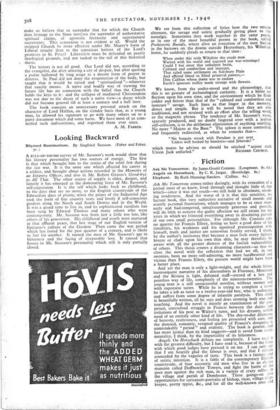. Fiction
Ask Me Tomorrow comes rather daringly, with its evocation of a period most of us knew, lived through and thought little of, but which—since it was our youth—we still hold in obstinate, sneak- ing tenderness. And the worst of it is that this sensitive, re- luctant book, this very subjective narrative of small moods and acutely pusonal frustrations, which manages to be at once man- nerly and bad-tempered, simultaneously generous and peevish, will do little to remove the guilty affection we still retain for the years in which we frittered everything away in desolating pursuit of our own small personalities. For although Mr. Cozzens asks no quarter for Francis Ellery, letting us have a good dose of his timidities, his weakness and his agonised preoccupation with himself, truth and justice are somewhat freshly served, I think, by the author's insistence that because a man feels every lightest breeze or chafe upon his own thin skin, he may therefore be aware with all the greater distress of the foolish vulnerability of others. This thesis creates a disarming character—so that we close the novel with the reflection that had we all, in our twenties been no more self-admiring, no more hardhearted and vicious ;Ilan Francis Ellery, the present world might have been a better place. And yet the man is only a light-weight, and the whole bitter, inconsequent narrative of his discomforts in Florence, Montreux and the Riviera is light, defeated stuff—record of a lost and pointless way of life, completely of the nineteen-twenties. The young man is a still unsuccessful novelist, without money and with expensive tastes. While he is trying to complete a novel he takes a job as tutor to a twelve-year-old boy, who is asthmatic and suffers from some degree of infantile paralysis. This child is beautifully written, all he says and does seeming both true and touching. And the novel is merely an examination of the per- petual, unresolved struggle in Francis between the duties and irritations of his post as Walter's tutor, and his dreamy, selfish need of an entirely other kind of life. The day-to-day dilemmas of honesty, restlessness, and feeling are presented with care, and the damned, romantic, resigned quality of Francis's dreaming is unmistakably " period " and realistic. The book is gentler, and has more justice than its kind suggests—and is saved from senti- mentality, I think, by the impartiality of its bitterness.
Angels On Horseback defeats me completely. I have read it with the greatest difficulty, but I have read it, because of the force with which good judges have pressed it on me. I can only saY that I am heartily glad the labour is over, and that I remain astounded by the vagaries of taste. This book is a fantasy, and of satiric intention. It is a fable of the contemporary English countryside of four eccentric old men who live in an elusive mansion called Doffbowler Towers, and fight the battle of the poor man against the rich man, in a variety of crazy sallies in the village and parish of Dombester. These goings-on give opportunities for caricature-portraits of bishop, vicar, village shoP- keeper, pretty typist, &c., and for all the well-known pros and
cons of these types. But if anything new or penetrative gets said, I was too stupefied to catch it ; in any case, the author's giggly historic presents, his short, nudging sentences, and odd, yokelish indecencies put me and kept me against him. This very odd book is certainly not my cup of tea, but it is, in its way, a curiosity—an English Marx Brothers' tale with a moral.
Mrs. Manning-Sanders' simple tale of a naughty, sweet elephant and her devoted circus attendant asks neither for praise nor blame. It is the sort of story for which there will always be many readers, and in its own way it is efficiently written.
KATE O'BRIEN.



























 Previous page
Previous page